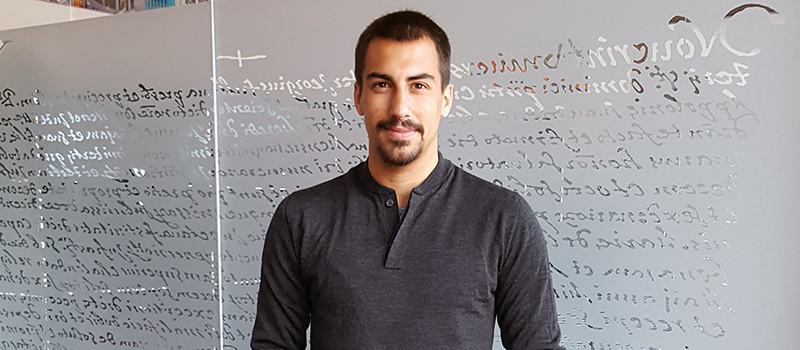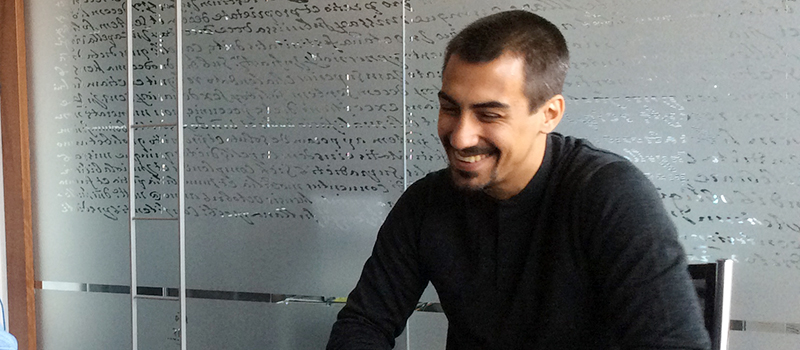Xisco Jiménez: “The discovery was amazing and highly emotional because we had the good fortune to experience it directly"
Interview with Xisco Jiménez, the Mallorca astrophysicist who took part in the detection of gravitational waves
Xisco Jiménez is a physicist and member of the Relativity and Gravitation Group at the University of the Balearic Islands, the only group in Spain affiliated to the LIGA and GEO international collaboration projects involving 1,000 scientists from fifteen countries. This observatory’s mission is the detection of a phenomenon suggested by Einstein, that of gravitational waves.

– How does it feel to have contributed to one of the biggest scientific discoveries of the year, the detection of the gravitational waves theorized by Einstein exactly a hundred years ago?
– It was amazing and highly emotional, especially for us as the youngest researchers who are new recruits to the field of science but had the good fortune to experience it directly. I say that because many people worked on this project, but for us, who practically just happened to be there, we found we had won the lottery just a few years after starting out. We had direct information available to us because my thesis colleague was right there where the detectors are located and was able to see what was happening in real time on the big screens. Imagine it, to experience such elation and then, for various bureaucratic reasons and confidentiality commitments, not be able to share the discovery beyond the team members. Fortunately we were in contact and were able to discover it almost instantaneously, first-hand.
– Imagine you are in front of a class of 10 to 12 year-olds. How would you explain this phenomenon so that they could understand it?
– As you know, the scientific article talks of two black holes colliding and disturbing that strange something that is spacetime. This begins to vibrate and it is then that these vibrations reach us. But that’s too complex and technical. So to put it into real, everyday terms, imagine you are standing in front of a lake that is absolutely smooth, still and stable, and you throw a stone into it. Imagine you’re blind as well and that you’re standing with your feet on the bank, then you would observe that something was happening in that smooth lake because you would begin to notice oscillations in the water caused by the impact of the stone. So if, instead of a small stone, you start to throw bigger and bigger stones, those waves or disturbances would be bigger and bigger and therefore the impact you would feel would be much greater.
So the analogy would be this: we need objects that are truly massive and very compact, like black holes (the stones), in order to make space (the lake) vibrate. What these holes do is move the points of space, causing them to vibrate, and with them ourselves and everything else contained in space.
– Right now you are immersed in your doctoral thesis, based on the study of gravitational waves. Tell us a little about where you’re at with that and what you still have left to do.
– The thesis is in its final stages now. I am currently in the writing stage and I hope to defend the thesis by the end of December. Evidently all this new material that has appeared since last September, since this discovery, that is, is going to be very useful, to make the thesis more attractive, at least. Future projects? We will try to carry on researching. For the sake of the health of science, that will probably take place outside Spain; also because the possibilities are limited here. It’s not easy for young researchers to work in this country.
– How is a project as big as this coordinated at the UIB through your research group?
– How do you coordinate a programme on such a large scale? Well, imagine how discussions arise in a family of four, five or six people: it’s no different in a large community of researchers. But the fact of having these different visions from such different countries and from so many people bringing different ideas to the table is what makes this type of project successful. In fact, this collaboration actually began as an exclusively American project between the Massachusetts Institute of Technology and the California Institute of Technology (Caltech). But they quickly realized they needed the input of minds from other continents and went beyond the American continent in order to bring about a vastly increased development of pure science and theory.
– The UIB has a very good reputation internationally in certain fields of scientific investigation. What do you think of the work being done in the different subject areas, and in particular in the field of physics?
– I think it is a university categorized with a seal of excellence, on the official level. Unofficially speaking, clearly there is always room for improvement. In other words, we are a small faculty, we don’t have many students, that much is true, but if I had a complaint it would be about the lack of interdisciplinarity that exists among the physicists, the scant contact that exists between adjacent offices. And how this reality may be projected in exhibitions of work to the general public, something which is of equal benefit to all. The most obvious example is in the lack of interconnection that I, as an astrophysicist and physicist in the Physics department, have with the Constitx observatory, that’s to say, there is practically no contact. It looks as if some new ideas are currently being handed down, but until now there has been no coherent, continuous collaboration with this observatory that we have here, and it is something that students could greatly benefit from.

– When did you know that you wanted to be a physics researcher?
– I knew from when I was a small boy. I knew then that I really enjoyed observing the sky and the stars, but I enjoyed it like any kid who likes to play at being a scientist, all the while getting more and more curious about the night sky. Then, as the years went by, I got other ideas, until I ended up studying Physics because of that old, somewhat bucolic idea of the boy who wants to be an astronaut or an astrophysicist. Then I said to myself, why not? When I started the first year of my degree I came across teachers with genuine expertise who were really interesting from a scientific point of view, and that confirmed my expectations.
– How do you think your passion for science has influenced your life? Do you think you have had to sacrifice social life because of your dedication to science or has it instead given you the opportunity to meet fascinating people and create new friendships?
– Personally, I’ve always been ranting because I saw that in other degrees the work programme seemed to be totally different to mine. But I certainly didn’t miss out when it came to the partying, let’s put it like that, so socially I haven’t been limited in any way, though it is true that the mechanics of the work were genuinely different to that of other fields of study where people tended to do things almost at the last minute, whereas my work needed to be followed continuously throughout the academic year. It is also true that this degree has enabled me to meet really respected scientists and some amazing characters. Above all, it gave me the opportunity to travel to congresses and get to meet many of those scientists with pages on Wikipedia packed with information. Having the opportunity to ask Roger Penrose or Stephen Hawking a question in person is a priceless experience. You have the photo, at least.
– What is your relationship with Bufete Buades?
– My relationship with Bufete Buades is one of friendship verging on family because of the direct link with my aunt and uncle, who are long-standing personal friends of Joan and Teresa. This has meant that I have met up with their son, Biel, on many occasions, and we have played together since we were small. It’s a friendly relationship.
– When you get away from the waves, what do you do with your free time?
– I love football and I’ve played nearly all my life. When I’ve tried to give it up, football hasn’t wanted to give me up. It’s a love-hate relationship and I’m still involved in it. Sport is my second passion – as a fan, obviously. Right now I play in the Third Division for Playas de Calvià. Sport is necessary. The experience you gain from your other competitive side, from another professional aspect, is invaluable, and the sum of the two parts is always a bonus.
– Where do you see yourself going professionally after you finish your doctoral thesis linked to gravitational waves?
– To answer that quickly, I would say with a post-doctoral stay, which are usually one, two or three years long, and abroad, if I’m lucky. Outside Spain they don’t seem so hard to come by as they are here. After that, I don’t know but I don’t rule anything out. Even a change of field is appealing, I mean, not working in pure science but trying to move into one of the many branches with a greater application in the corporate world. I have friends working in financial and consultancy companies, for instance. Of course, I would like to be able to develop my professional activity in teaching, but I can’t look further ahead than the next two or three years, or even one year.

Your refrigerator is never out of…
Water.
To achieve maximum concentration, you usually practise…
Sport.
Your favourite Mallorca dish and who makes it best
Definitely Arròs brut (Mallorca-style risotto with wild mushrooms and game), and I have to name two chefs: my mother Amelia and my aunt Mercedes.
The image that best encapsulates happiness in your childhood
That would probably be on a football field, celebrating a win.
A historical figure you would have liked to meet and why
I would like to have met Albert Einstein, but away from a scientific context, probably with a guitar and three beers too many, having a conversation that wasn’t all about science but about other aspects of life.
The quality you most admire in a person
Courage.
Xisco Jiménez is never away from…
His friends.
A place you would like to escape to for a time
If I had to go somewhere really extreme, I would go to India to work for a year, for example. Nearer home, who knows, I would go to any country…




































